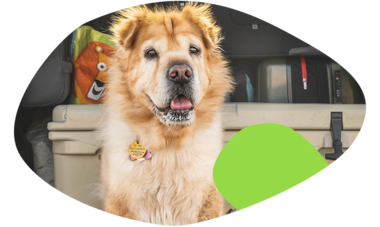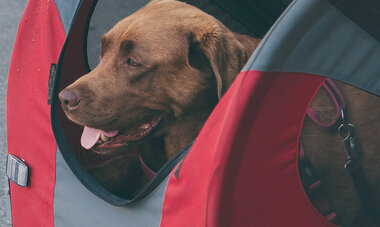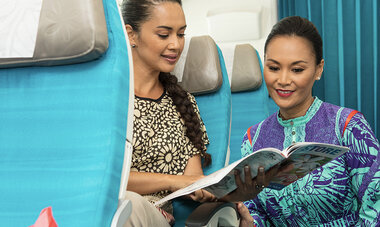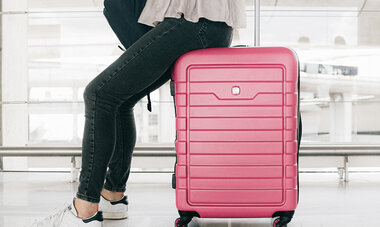
Traveling with Pets and Service Animals

Do you plan to travel with your pet or service animal? You will find all the necessary information here to help you prepare for your trip including transportation rules and conditions, fares and the list or prohibited animals.
Pets in the cabin
Air Tahiti Nui allows only vaccinated dogs and cats to travel in the cabin with their owners on the following flights only:
- Los Angeles – Paris
- Paris - Los Angeles
- Papeete - Los Angeles
- Papeete - Paris.
Minimum Age Requirements
- For transit through or travel to the United States: Cats must be at least 4 months old, and dogs at least 6 months old. For more information, please visit to the CDC website and refer to the section “From August 1, 2024, Onward: Entry Requirements for Dogs from Dog-Rabies Free or Low-Risk Countries” if the dog has been in only these countries (Dog-Rabies-Free or Low-Risk Countries) in the past 6 months. French Polynesia, France, and the United States are not considered high-risk countries for rabies. For dogs that have been in high-risk countries for rabies, please refer to the CDC website for more information.
- For travel to other destinations: Cats and dogs must be at least 4 months old.
Conditions for accepting and transport of pets in the cabin :
- Only vaccinated cats and dogs are accepted.
- For travel to the United Sates, pets must be identified with a microchip.
- For travel to France, pets must be identified with a microchip, or a tattoo, provided the tattoo was applied before July 3, 2011, and remains clearly legible.
- For travel to other destinations, pets must be identified with a microchip.
- The health and entry requirements specific to the destination country have been reviewed and considered. If not, please check with the relevant administrative authorities.
Conditions for transporting pets in the cabin:
- The combined weight of the animal and its carrier must be less than or equal to 8 Kg (about 17.6 pounds),
- The animal must remain in an appropriate pet carrier (either soft or rigid) that can easily fit under the seat in front of you throughout the flight. The pet carrier’s maximum dimensions should be no larger than L40cm x W35cm x H20cm (L15.7in x W13.7 x H7.9in).
- One pet carrier is allowed per passenger, capable of accommodating up to two (2) small pets, provided that the total weight limit is respected 8kg or 17.6 lbs and that there is enough space in the pet carrier for these animals to move easily.
- Availability subject to quota per flight.
For any other animal inquiries, please contact our CARGO department.
Mandatory documents:
- Up-to-date vaccination records
- Valid Health Certificate issued by a veterinarian. The certificate must include the weight, size, and breed of the animal. Please forward the requested document to our reservation service on or after 48 hours before the flight departure.
- Print and complete the mandatory waiver of responsibility and the conditions for bringing a dog or cat into the cabin. You will be asked to present this upon check-in on the day of your departure.
- An Import permit issued by the destination country is required. The traveler is responsible for ensuring compliance with all import regulations of the destination country. Failure to meet these requirements may result in the animal may be denied entry upon arrival, and it may be repatriated to its country of departure at the passenger's expense.
Important Notice: Key Points Regarding Your Dog’s Travel
- Failure to comply with these rules may result in your dog being denied boarding.
- For transit through or travel to the United States: The new CDC regulation regarding pet dogs and service dogs is subject to change at any time without notice. We recommend regularly checking for updates on the CDC’s guidelines and ensuring that you are in compliance with the latest requirements.

Transportation fees are based on flight :
- From Los Angeles / to Paris : 150 US dollars
- From Paris to Los Angeles : 150 Euros
- From Papeete to Los Angeles : 14 000 XPF
- From Papeete to Paris : 24 000 XPF
Carriage of animals in the cabin is free on board our rail partner SNCF for journeys to and from the provinces, as part of the Train + Air package. The purchase of a ticket for your pet is no longer required.
More information on entry and departure requirements for pets (cats and dogs)
Polynésie Française : Importation et exportation of pets
France : Importation et exportation of pets
USA : Importation et exportation of pets
Service animals
A “service animal” is defined as “an animal individually trained to provide assistance to an individual with a disability”.
This definition excludes all non-trained animals such as emotional support animals, pets and trained animals. The latter will have to comply with the rules for transporting pets in the cabin or in the hold.

Service animals are essential in assisting individuals with diverse challenges including:
- Agoraphobia,
- Autism,
- Epilepsy,
- Mobility impairment,
- Post-traumatic stress disorder,
- Psychiatric syndrome,
- Deafness,
- Vision impairment and loss of vision.
These exceptional animals perform essential tasks, such as:
- Guiding individuals with visual impairments,
- Alerting those with hearing impairments to important sounds or signals,
- Assisting individuals with limited mobility by retrieving items and aiding in wheelchair movement,
- Sensing and alerting individuals to imminent seizures caused by epilepsy,
- Informing people with diabetes about fluctuations in their blood sugar levels,
- Providing support to individuals who experience dizziness or unsteadiness,
- Reminding individuals with memory loss to take their medication,
- Initiating emergency calls in critical situations.
Minimum Age Requirements
- For transit through or travel to the United States: Cats must be at least 4 months old, and dogs at least 6 months old. For more information, please visit to the CDC website and refer to the section “From August 1, 2024, Onward: Entry Requirements for Dogs from Dog-Rabies Free or Low-Risk Countries” if the dog has been in only these countries (Dog-Rabies-Free or Low-Risk Countries) in the past 6 months. French Polynesia, France, and the United States are not considered high-risk countries for rabies. For dogs that have been in high-risk countries for rabies, please refer to the CDC website for more information.
- For travel to destinations: Cats and dogs must be at least 4 months old.
Conditions for accepting of Service Animals:
- A maximum of two service dogs or one service cat per passenger is allowed.
- For travel to the United Sates, pets must be identified with a microchip.
- For travel to France, pets must be identified with a microchip, or a tattoo, provided the tattoo was applied before July 3, 2011, and remains clearly legible.
- For travel to other destinations, pets must be identified a microchip.
- The health and entry requirements specific to the destination country have been reviewed and considered. If not, please check with the relevant administrative authorities.
Conditions for transporting Service animals in the cabin:
- During the flight, the service animal must remain by its owner's feet or on their lap, without encroaching on another passenger's space.
- Service animals must not obstruct aisles or be placed in front of emergency exists.
- The hygiene, veterinary care and feeding of the animal are entirely the responsibility of the person accompanying it.
- Air Tahiti Nui reserves the right to decline carriage of service animals that display aggressive behavior and/or represent a direct threat to the well-being and safety of others.
- Required Accessories : a leash (with its harness or collar) and a muzzle are mandatory. An Air Tahiti Nui agent may request that a service animal be kept on a leash and/or muzzled at any time during the trip, if it is deemed necessary for the well-being of other passengers and the crew. Failure to comply with such a request may result in denied boarding.
Mandatory documents
- Valid Health Certificate or passport issued by a veterinarian. The certificate must include the weight, size, and breed of the animal.
- For transit through or travel to the United States: According to the US DOT 14 CFR Part 382, the following documents (in English only): “Service Animal Air Transportation Form” and, “Service Animal Relief Attestation Form” . These documents, whether in paper or electronic format, will be required at the Air Tahiti Nui check-in counter on the day of your departure.
- An Import permit issued by the destination country is required. The traveler is responsible for ensuring compliance with all import regulations of the destination country. Failure to meet these requirements, may result in the animal being denied entry upon arrival, and it may be repatriated to its country of departure at the passenger's expense.
Important Notice: Key Points Regarding Your Dog’s Travel
- Failure to comply with these rules may result in your dog being denied boarding.
- For transit through or travel to the United States: The new CDC regulation regarding pet dogs and service dogs is subject to change at any time without notice. We recommend regularly checking for updates on the CDC’s guidelines and ensuring that you are in compliance with the latest requirements.
Prohibited animals:
We remind you that as defined by the French Ministry of Agriculture, Food and Forestry, the transportation of dogs that may be dangerous, i.e. category 1 (attack dogs) and 2 (guard and defense dogs) is prohibited on board our aircraft.
Please refer to the classification list of dangerous dogs of 1st and 2nd categories.
This also applies to a dog crossed with one of these breeds.

Examples :
- Pitt Bulls,
- American Staffordshire terrier,
- Rottweiler,
- Dogo Argentino,
- Fila Brasileiro,
- Broholmer,
- German mastiff,
- Majorca mastiff,
- Bordeaux mastiff,
- Bulldog,
- Bullmastiff,
- Mastiff,
- Neapolitan Mastiff,
- Italian Cane Corso and Tosa, ...


